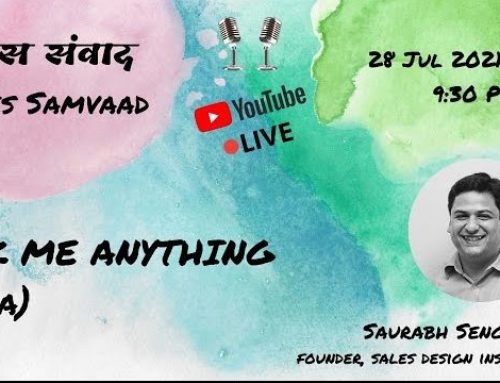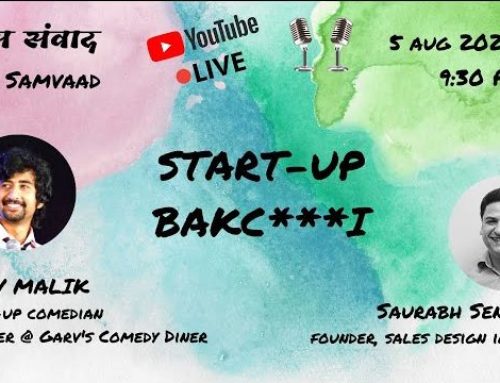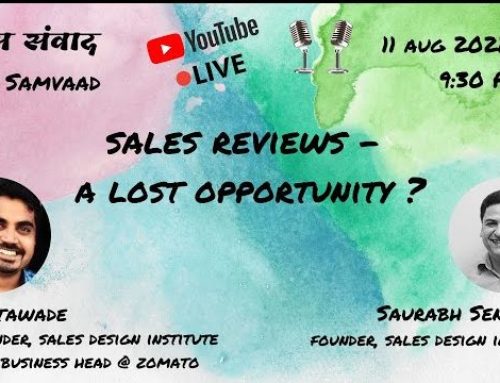About the speaker
Prof Sridhar Guda has been teaching at IIM Kozhikode for over 14 years now. His Linkedin profile says “Aim is to make Sales Profession nobler” which struck a chord with me. He is passionate about learning and advocating best practices in Selling, Rural Marketing and Distribution Channels.
Prof Sridhar has also written papers on a not-so-talked-about topic of Spirituality and Sales. You can check out some of his works here: https://scholar.google.co.in/citation…
Topics covered
- Defining spirituality in sales
- Individual vs. Workplace Spirituality
- What got Prof Sridhar to explore this topic in the context of customer facing roles
- Prof Sridhar’s enquiry into high performing sales reps, their skills and what drives them
- Indicators for sales leaders
- Can “Emotional Control” and spirituality be coached?
- Some audience questions
Call Notes
- Prof Sridhar from IIM Kozhikode
- Saurabh: First got to know about Prof. Sridhar’s work from the Book the Ultimate Sales Accelerator
- Saurabh was excited by the fact that Prof Sridhar researches Spirituality in Sales and his articulation of the subject
- Saurabh: How would you define spirituality considering we are complete novices?
- Prof Sridhar: People have been trying to define spirituality since the beginning of time. In academic circles spirituality is different from religiosity
- Religiosity will have certain rituals. These rituals are used to navigate the pursuit of god or a higher power.
- With Spirituality the belief is that there is a supreme force and there is no specific means of driving it
- The definition of supreme differs from person to person
- Prof Sridhar: Spirituality is looking into your spirit – the invisible force you have at your disposal
- When it comes to your professional life – “Why am I in sales?” – if you are in pursuit of an answer to this question then you are on a quest for your spirit
- The purpose of sales, in Prof Sridhar’s opinion, is Serving. Whether it’s serving your organizations, customers, stakeholders, shareholders
- If you keep refining this in the quest of how to better “serve”, you’ve probably started your spiritual journey
- Saurabh: In some of your papers I’ve come across this term ”Workplace Spirituality”, could you elaborate?
- Prof Sridhar: Workplace spirituality is different from Individual Spirituality
- Workplace spirituality – Considers one element as self transcendence – going beyond what you are | treating everyone the way they need to be treated in a fair manner considering work as worship
- Individual Spirituality – involves looking inwards and finding what your purpose of life is
- When it comes to sales and spirituality, we are probably moving between workplace and individual spirituality
- Saurabh: What got you to explore the relationship between Spirituality and its relevance in an organization in a Customer Facing role?
- Prof Sridhar: A large chunk of credit goes to my first PhD scholar Vaibhav (Chawla) who was exploring this subject and the PGP students who keep asking questions around “Why Sales”
- To find the answers – Enquiry with executives gave Prof Sridhar critical insight
- When Prof Sridhar looked at high performers – “they are no longer bothered by targets that their bosses give them – they are in some sort of a trance – they are confident about achieving”
- These people innately know that they can achieve even if they give you another picture
- High performers are at ease with their lives – they are on a quest to satisfy themselves on a higher level.
- After a conversation Prof Sridhar had with a top Sales Leader about the broad issue of “What are the problems with sales people?” -> they identified that one of the bigger issues are the psychological issues of low self esteem of sales people
- Successful salespeople transcend the self esteem problem – they tend to be “in the zone” for every moment of their lives and stay on top
- Saurabh: “So they aren’t really sweating target achievement in their heads?”
- Prof Sridhar: “Don’t mistake that spirituality means not sweating. Spirituality doesn’t mean relinquishing short or long term goals. They have found their purpose which is – serving whoever the role demands and they are in a constant quest to transform themselves to serve that role
- The 4 broad skills that sales people typically need are – 1. Selling skills 2. Knowledge of Product and Customer 3. Emotional Quotient and 4. A Healthy Mindset
- There is also a broad meta-construct of Spirituality. This drives them to learn -> become more skillful -> Be emotionally better -> and with a health mindset
- Saurabh: From the PoV of Sales leadership: “Are there certain behaviours which are different high performers who are spiritual vs. those who aren’t? Is this observable?
- Prof Sridhar: There could be 4-5 indicators
- Typically spiritual people are able to thread the fine line and navigate stressful and situations that challenge their self esteem
- Tapovai dwandva sahanam (Refer article by Prof Guha) – which means a Tapasvi (who performs penance) can hold two opposites with forbearance. – How a sales person can hold both failures and success at the same time is an indication
- There is a glow around this person – they remain reasonably Well or Happy over a meaningful period of time
- From the movie Door to Door – about a person with cerebral palsy who went on to become the greatest door to door salesman – he highlighted Persistence as his secret. More spiritual salespeople are typically more persistent
- Saurabh: One common point I notice is that these people typically have greater “Emotional Control” and tend to Not have emotional swings. Do you think this can be coached into sales reps?
- Prof Sridhar: Spirituality is an individual pursuit. Having said that – organizations can facilitate individual evolution.
- From an unpublished research paper with Vaibhav on “delayed gratification”. There are indicators that sales people that typically delay gratification may not achieve short term targets but tend to be more customer centric and adaptive – this however is tough to implement in a fast moving world and is a question leaders have to consider
- Leaders have to highlight how salespeople create impact with their customers. Prof Sridhar has observed that salespeople in some industries don’t understand the on-ground product impact
- When a salesperson Feels they matter in the organizational scheme, there is a growth of faith – this is critical and leads to a slow movement towards what we call spirituality
- Saurabh: I see trends towards “mindfulness workshops”. If organizations can light a spark and make incremental changes I feel that’s a win.
- Prof Sridhar: The ultimate aim of an organization should be to make a salesperson remain in a state of happiness. Age old thinking says that you’d be more creative and productive in a state of happiness. In the current scenario of pressures and daily calls, the focus has shifted from a customer centric view to dwelling on what the boss is asking for (numbers, targets etc.)
- Saurabh: I personally believe coaching helps people find a center to an extent but there has to be an individual pursuit as you said to hold opposites – success and failure together.
- How do you identify people who are more spiritual in interviews (not limited to sales interviews)? Is it purely behaviour or is there more?
- Prof Sridhar: Tough question, tough to identify in a 30-minute interview. However let me try explaining using a famous story by Bhakt Thukaram, (could be hearsay) – He constantly chanted the name “Vithala” (A hindu deity worshipped predominantly in Maharashtra) even when he used the bathroom. More hardened scholars were unhappy and questioned how he could do this while in the bathroom and it was wrong. He stopped doing this, but they still heard the chant. They realized that every single pore resounded with “Vithala” – Coming back – We can at least look for – How much do candidates “own” the job they seek in an interview
- From modern examples – this scene from the movie Pursuit of Happiness will give you a good example
- Modern metrics and psychometrics tests can help also
- Saurabh: From my experience while taking interviews, candidates go into a “state of flow” of stories where they forget the coffee kept in front of them.
- A lot of sales people are in a state of flow where they are constantly imagining client situations in their heads, they tend to rehearse these situations constantly
- Prof Sridhar: Agreed, these people do tend to be good mid-long term bets
- Saurabh: Yes, these people tend to be high performers but they also tend to be more Consistent
- Prof Sridhar: Measuring the right metrics also gives a good indication of teams and individual spirituality levels
- Saurabh: Managers do have a huge onus to measure but it does require high involvement to measure things required to find out how spiritually rooted their teams are
- Prof Sridhar: Frontline sales people are the crux of an organization so spending time there will yield results
- Saurabh: When I was asked why we were covering this topic of Spirituality in sales, I’ve felt it myself and having engaged in certain practices, I see the benefits of exploring this aspect
- Saurabh: One question from the audience – People who already enjoy sales, wouldn’t they already be aligned with the concept and be “more spiritual”?
- Prof Sridhar: Yes, this is what we call a “virtuous cycle”. Typically when you enjoy the process it is a virtuous cycle – when you get results -> you are happy -> you do better
- Saurabh: On the matter of self actualization, from my personal experience and people I’ve observed closely – self actualization may not be directly related to sales but as you said, improving their self esteem all the time. I’ve observed performers who enter other streams are still trying to win and looking to treat their self esteem in some way
- My takeaway and a layman definition – just look for people who are consistently joyful and at peace with themselves and you’d find they are more spiritual than others
- Prof Sridhar: I think sales has become a taboo becauses of it’s short term focus. It’s high time sales becomes a more noble profession, and this is a call that has to be taken at different levels. By elevating levels of spirituality, this will be achieved
- Saurabh: Question from the audience: Sometimes the work philosophy of a salesperson may not be aligned with an organization’s views. How do we navigate?
- Prof Sridhar: If you aren’t aligned, don’t be in that job. There is no dearth of jobs.
- However, in some cases, there may not be a choice for whatever reason – if your way of working is not aligned, things will be tough. One way out – sit with your boss and lay out your views. Contrary to popular belief – most bosses are good and will help
- Second, find out if you can work with other teams / roles where your alignment with organizational goals are higher
- Saurabh: I agree. You could try but there’s no assurance here. Eventually people move on. Personally, I think this is a good outcome. Eventually you find an organization that matches your views and the earlier this happens the better
Check out our B2B lead generation services to boost your performance. We generate qualified B2B leads globally completely using social selling. Watch our exciting Sales Samvaad videos which give you practical knowledge for better understanding. Click here to know more.

If you need our help in Sales Development, please write back to me at saurabh@salesdesign.co.in
For more information B2B Lead Generation Get in touch



